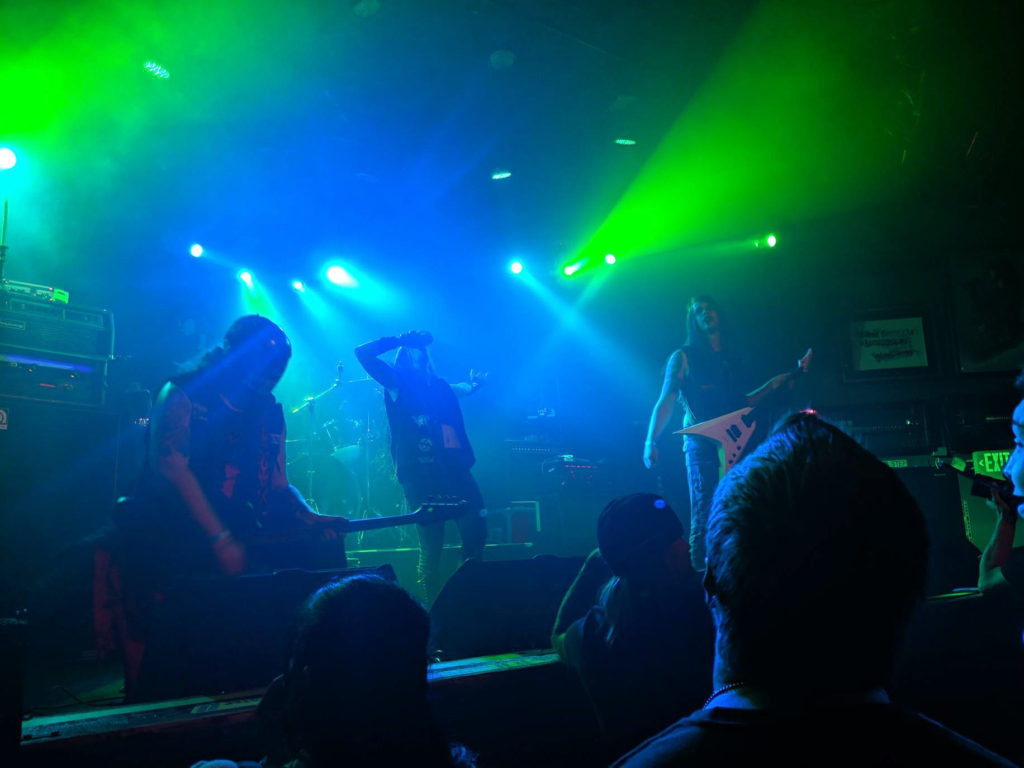The art of extreme vocals in heavy metal culture
Ventura metal band Disrupted Euphoria waited patiently in the wings of the small bar, Whisky a Go-Go, on Los Angeles’ famed Sunset Boulevard, as a one-man electronic band finished up his last song.
Frontwoman Hannah “Rebel” Ribble cheerily bobbed her head to the music, chugging down much of her water in only a few moments.
She was preparing her voice to make maniacal sounds some would call shocking or scary.
Extreme vocals are most often used in metal and punk genres. Various types of growling, screaming and guttural noises are used to convey intensity beyond what singing may express.
The roots of these vocal styles are as old as rock n’ roll itself, with artists in the 1950’s such as Little Richard, Screamin Jay Hawkins and James Brown gaining fame belting lyrics in moments of passion.
However, many modern acts today, such as Disrupted Euphoria, have harnessed this sound and taken it up another level to show that extreme vocals are an entirely new style that are as technical as conventional singing.
Ribble explained Disrupted Euphoria’s early days consisted of performing mainly covers of other band’s work until she began to dabble with growling.
“Austin, the guitar player, asked me if I wanted to learn how to growl. It was about nine months in when I was finally like, OK, I can finally do this and, one, it doesn’t hurt, and, two, it doesn’t ruin my throat when I’m all done,” Ribble said.
Learning how to manipulate her voice in several ways has also been fun for Ribble. She likes how anyone can learn, regardless of gender or singing ability.
“The thing that’s the most fun about it is that you’re suddenly sounding like a dragon,” Ribble said. “You’re not using your actual voice, so there’s no reason for it to even sound feminine or masculine. It becomes irrelevant at that point. It’s pretty cool. It’s just a human thing.”
Extreme vocals are an acquired taste, and bands usually accompany it with dark lyrical imagery, along with a rebellious or evil-themed performance.
Guitarist Austin “Shadowsill” Mitrofanis said he finds the band’s practice sessions to be therapeutic.
“We’re an excellent outlet for aggression and frustration,” Mitrofanis said. “Most of the time, when I’m having a hard week, I know I have band practice or a show coming up, and it’s cathartic when the four of us get together.”
Pierce College’s Music Professor Garineh Avakian explained how Ribble may be able to maintain a growl-like distortion in her voice.
“One of the ways that you can do it right is finding the right pitch for you to growl on or yell on,” Avakian said. “So that’s something that I do. Like when I have to get mad, I don’t use my throat. I just pop my sound into the head voice, and it’ll be really loud.”
Avakian emphasized that air control is most important when doing any kind of vocals.
“We are a wind instrument, so everything that we do with the voice is based on breath,” Avakian said. “Your bottom line engine is your breath management and your breath support.”
Similarly, Ribble avoids putting tension in her throat and uses more of her head voice and face. This technique is meant to prevent vocal cord damage.
“A lot of the sound is manipulated by how you hold your jaw or your tongue, or how open wide your mouth is,” Avakian said.
Ribble laughed a bit when she recalled first achieving a powerful growl.
“Eventually, when the noises start to come out correctly, there’s just that, holy sh** I’m doing it moment. It’s like when you’re finally riding a bike,” Ribble said.
Mitrofanis understands that same feeling of excitement through the aggressive performance and sound of metal music.
“I think metal fans enjoy harsh vocals because the metal is already a very primal genre of music,” he explained. “I can feel a sense of happiness and ease when I’m listening to it. Then there are millions of other people that feel the same way, so it’s one gigantic family of headbangers and moshers.”
To hear what the Pierce College Community thinks about heavy metal music, listen to the KPCRadio.com audio package by staff member, Paola Castillo







